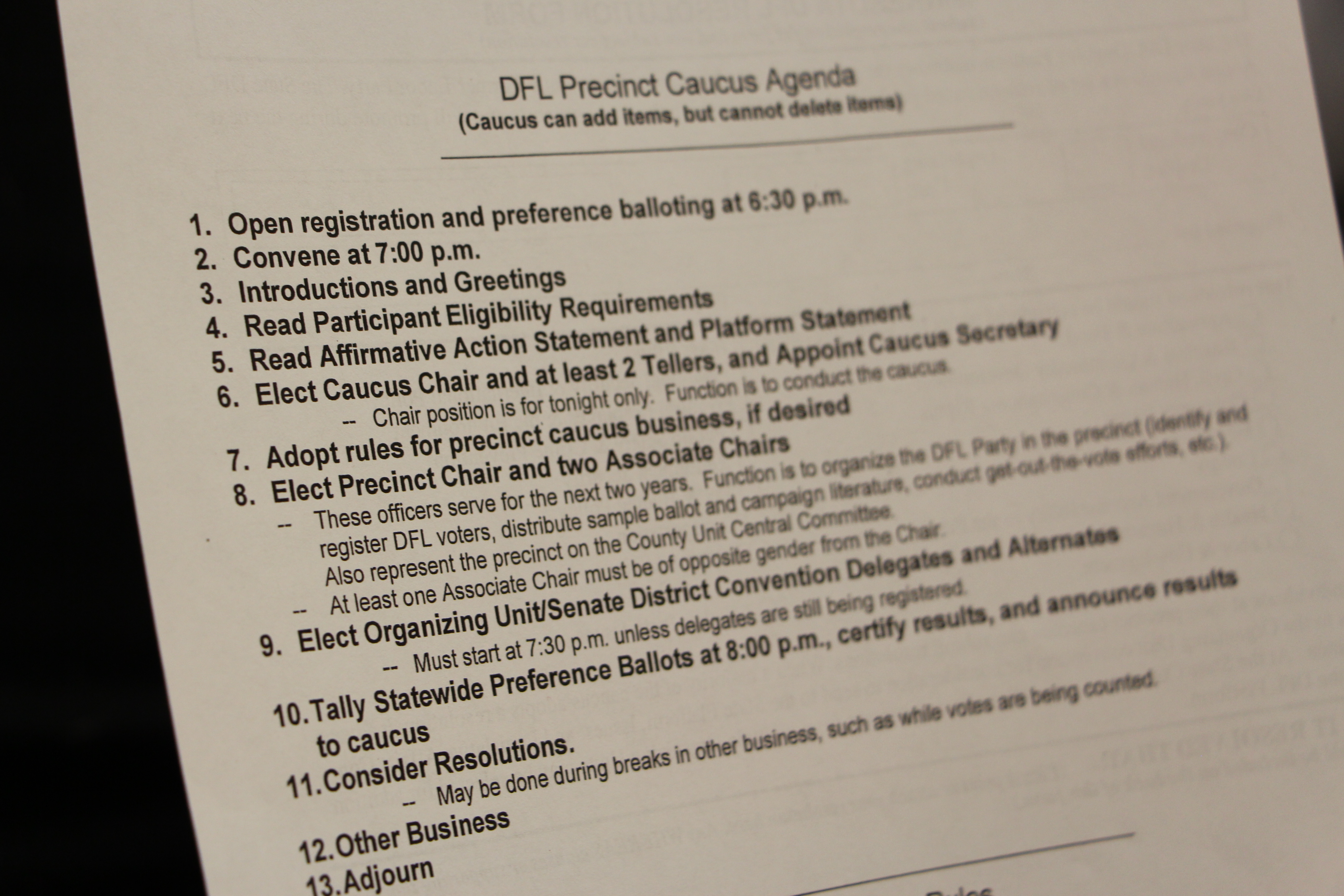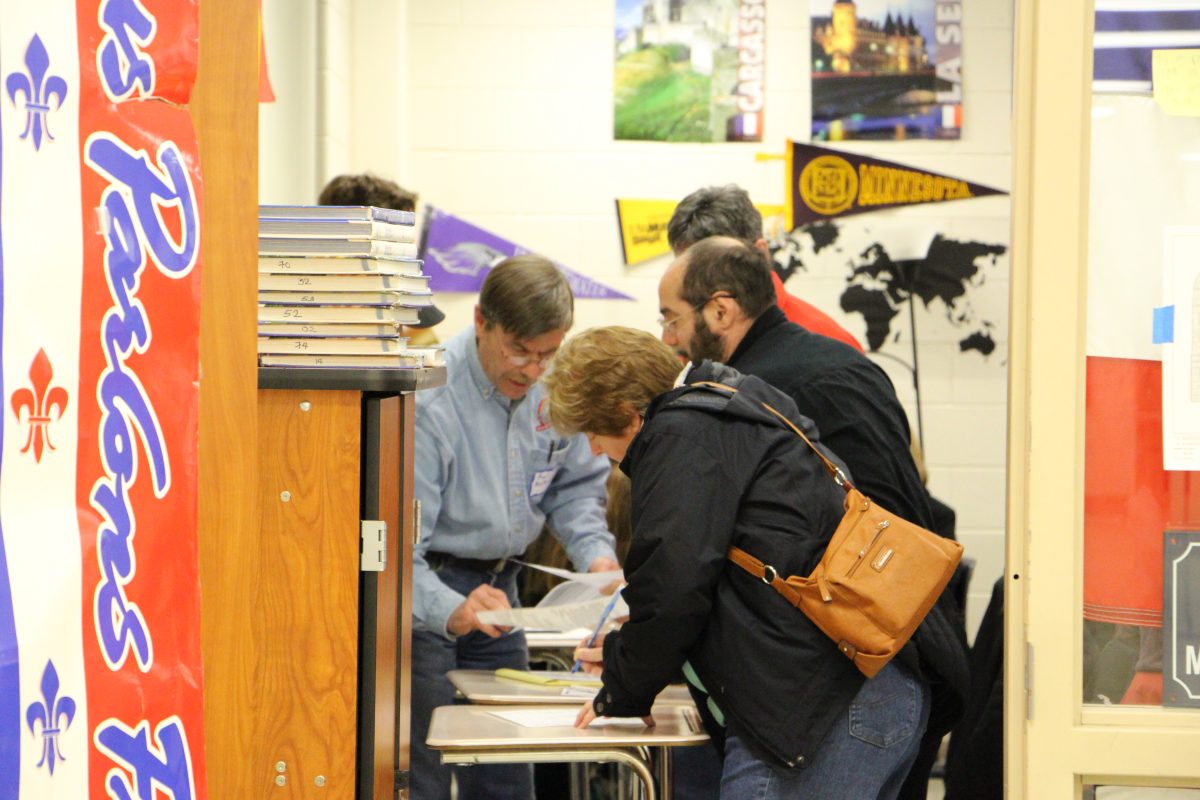Minnesotans rally to cast their votes March 1.
Abby Petersen | The Clarion
[Editor’s note: Story updated at 2:30 p.m. March 2 with new numbers and reaction.]
An elderly man with a thick mustache shuffled over to two women holding ballots in a Spanish classroom at Andover High School, which served as a caucus precinct March 1.
“I’m not a Democrat,” he whispered.
Voters wandered around the high school hallways, looking for the room that hosted their precinct – or, in some cases, studying precinct maps to find out what precinct they belonged to in the first place. In order to cast their votes, they had to check in at the front desk.
Caucuses and primaries are being held throughout the country in the months preceding the Nov. 8 presidential election. Each state is assigned a unique caucus or primary date as well as various locations to cast votes and meet based on presidential primaries and voter precincts.
Super Tuesday consisted of primaries in Ala., Ark., Ga., Mass., Okla., Tenn., Texas, Vt., and Va. Caucuses were held in Ala., Colo., and Minn. A primary is conducted similar to the general election; voters cast a secret ballot for which candidate they want. An open primary means a voter can choose any candidate they want no matter the party they are registered for. A closed primary allows a voter to only cast a ballot for a candidate within their party registration.
 In a caucus, like Minnesota’s last night, voters travel to their precinct room and enter their name, address and signature before being handed a small piece of paper listing that party’s candidates. Voters then have the option to participate in their precinct’s electoral process for precinct chair, associate chairs and delegates—or simply turn in their ballot and leave. In the case of Andover High School, that ballot was a bright blue slip of paper that, once filled out, was tossed in a cardboard box. Any voters could stay and wait for the ballot tally at 8 p.m.
In a caucus, like Minnesota’s last night, voters travel to their precinct room and enter their name, address and signature before being handed a small piece of paper listing that party’s candidates. Voters then have the option to participate in their precinct’s electoral process for precinct chair, associate chairs and delegates—or simply turn in their ballot and leave. In the case of Andover High School, that ballot was a bright blue slip of paper that, once filled out, was tossed in a cardboard box. Any voters could stay and wait for the ballot tally at 8 p.m.
Minnesota caucuses began at 7 p.m. and closed sharply at 8, giving voters an hour to cast their ballots. While it’s easy to find the location and get there, this doesn’t necessarily correlate with a higher number of voters. At Bethel University, more than half of students polled said they had no plans to vote in the caucus, even with buses provided by the College Republicans. About 30 percent of students said that they planned on voting, and 15 percent were undecided. But 90 percent of students said that they planned on voting in November.
After the ballots were counted in Minnesota, Marco Rubio came out on top for the Republican Party with 36.8 percent of the vote, followed by Ted Cruz with about 28.9 and Donald Trump with 21.2. Nationally, Trump came out the big winner, taking seven states and solidifying his front-runner status. Rubio’s Minnesota win is his first.
“No political scientist saw this coming,” political science professor Andrew Bramsen said in regards to Trump’s national success. “We’re lying if we would have said we saw that coming.”
Bramsen, who specializes in comparative politics and political theory, understands Trump’s appeal as well as why that appeal didn’t work in Minnesota.
“We’re reluctant to go with the more angry rhetoric of Trump or Cruz,” he said. “I think [Trump is] tapping into a real anger in the base and it accords to what Americans want to believe.”
As for the Democrats, Bernie Sanders finished with more than 60 percent of the vote and Hillary Clinton had less than 40 percent. These numbers contrast the national results, where Sanders won four states (and 29 percent of delegates) to Clinton’s seven (71 percent).
Bramsen isn’t sure whether anti-trump Republicans would be willing to cross party lines in the November election.
“Republicans also have a long and unpleasant history with Hillary,” he said, “and she’s going to win the nominee.”

![Nelson Hall Resident Director Kendall Engelke Davis looks over to see what Resident Assistant Chloe Smith paints. For her weekly 8 p.m. staff development meeting in Nelson Shack April 16, Engelke Davis held a watercolor event to relieve stress. “It’s a unique opportunity to get to really invest and be in [RAs’] lives,” Engelke Davis said, “which I consider such a privilege.”](https://thebuclarion.com/wp-content/uploads/2024/05/041624_KendallEngelkeDavis_Holland_05-1200x800.jpg)















